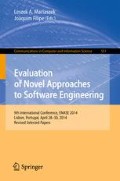Abstract
Inherent properties of games, such as rules, goals and interaction, have made them popular to address challenges and sort obstacles in a wide variety of contexts. Within Software Engineering, a challenging activity of the software development process is the Inception phase, in which stakeholders’ needs, required functionalities, objectives, risks and constraints of a software product are established. An alternative to optimize stakeholders’ participation during the Inception phase and make more efficient its outcomes is to do it through games.
Taking into account the uncommonness of games in Software Engineering development process and the lack of complex methods that include games, this paper presents ActiveAction, a method that combines classical requirements specification techniques with games. ActiveAction resulted in a successful game-based strategy that has improved the Inception phase of the software development projects based on the fact that stakeholders express their ideas freely in an unstressed environment; real-life scenarios are simulated to identify exceptions; requirements and risks are determined in a collaborative manner. It is concluded that the inclusion of games in such a challenging activity as software projects inception, is feasible and reported promising results that benefit both stakeholders and software developer organizations.
Access this chapter
Tax calculation will be finalised at checkout
Purchases are for personal use only
References
Michael, D., Chen, S.: Serious Games: Games That Educate, Train, and Inform, 1st edn. Muska & Lipman/Premier-Trade, Cincinnati (2005)
Abt, C.: Serious Games. Viking Press, New York (1970)
Serious game initiative. http://www.seriousgames.org/
The Standish Group International, Inc., CHAOS Summary for 2010 (2010)
Stepanek, G.: Software Project Secrets: Why Software Projects Fail, 1st edn. Apress, New York (2005)
Kruchten, P.: Rational Unified Process – An Introduction, 3rd edn. Addison-Wesley, Boston (2003)
Gartner survey shows why projects fail. http://thisiswhatgoodlookslike.com/2012/06/10/gartner-survey-shows-why-projects-fail/
Ambler, S.: Defining success. Dr. Dobb’s J. (2007). http://www.drdobbs.com/architecture-and-design/defining-success/202800777
Ibrahim, R., Ayazi, E., Nasrmalek, S., Nakhat, S.: An investigation of critical failure factors in information technology projects. J. Bus. Manage. IOSR 10(3), 87–92 (2013). ISSN 2319-7668
Geneca, LLC: Doomed from the start? Why a majority of business and IT teams anticipate their software development projects will fail. Geneca Industry Survey (2011)
Bloch, M., Blumberg, S., Laartz, J.: Delivering Large-Scale IT Projects on Time, on Budget, and on Value. Insights & Publications, McKinsey & Company, New York (2012)
Mountain goat. http://www.mountaingoatsoftware.com/scrum/product-owner/
Passos, E., Medeiros, D., Neto, P., Clua, E.: Turning real-world software development into a game. In: Proceedings of the Brazilian Symposium on Games and Digital Entertainment, pp. 260–269 (2011). ISBN: 978-0-7695-4648-3
Claypool, K., Claypool, M.: Teaching software engineering through game design. In: Proceedings of the Innovation and Technology in Computer Science Education Conference, vol. 37, no. 3, pp. 123–127 (2005). ISBN: 1-59593-024-8
Gamestorming. http://www.gogamestorm.com/
Innovation games. http://innovationgames.com/
Knauss, E., Schneider, K., Stapel K.: A game for taking requirements engineering more seriously. In: Proceedings of the International Workshop on Multimedia and Enjoyable Requirements Engineering, pp. 22–26 (2008). ISBN: 978-0-7695-3626-2
Torvinen, V.: The labour game method. In: Proceedings of the International Workshop on Database and Expert Systems Applications, pp. 382–386 (1999). ISBN: 0-7695-0281-4
Entia. http://www.entia.com.mx/
Morales, M., Oktaba, H.: KUALI-BEH kernel extension. Annex B (informative). In: Essence – Kernel and Language for Software Engineering Methods. Object Management Group (2012)
Hohmann, L.: Innovation Games: Creating Breakthrough Products through Collaborative Play, 1st edn. Addison-Wesley Professional, Boston (2006)
LEGO: LEGO Serious Play: Open Source. The LEGO Group, Billund (2010)
Cantoni, L., Faré, M., Frick, E.: User Requirements with LEGO. University of Lugano. webatelier.net & NewMinE Lab, version 1.0 (2011)
Osborn, A.: Applied Imagination: Principles and Procedures of Creative Problem Solving, 3rd edn. Charles Scribner’s Sons, New York (1993)
Acknowledgements
The authors thank Miriam Eréndira Jiménez-Hernández and Roberto Azrael Medina-Díaz for on-site observation and initial analysis of the data.
This work has been funded by the GEODAS-BC project (Ministerio de Economía y Competitividad and Fondo Europeo de Desarrollo Regional (FEDER), TIN2012-37493-C03-01); GLOBALIA project (Consejería de Educación, Ciencia y Cultura (Junta de Comunidades de Castilla — La Mancha) and FEDER, PEII11-0291-5274); SDGear project (TSI-100104-2014-4), framed under the ITEA 2 Call 7, and co-funded by “Ministerio de Industria, Energía y Turismo (Plan Nacional de Investigación Científica, Desarrollo e Innovación Tecnológica 2013-2016) and FEDER”; the Graduate Science and Engineering Computing (PCIC-UNAM) and the grant scholarship program of CONACYT.
Author information
Authors and Affiliations
Corresponding author
Editor information
Editors and Affiliations
Rights and permissions
Copyright information
© 2015 Springer International Publishing Switzerland
About this paper
Cite this paper
Morales-Trujillo, M.E., Oktaba, H., González, J.C. (2015). Taking Seriously Software Projects Inception Through Games. In: Maciaszek, L., Filipe, J. (eds) Evaluation of Novel Approaches to Software Engineering. ENASE 2014. Communications in Computer and Information Science, vol 551. Springer, Cham. https://doi.org/10.1007/978-3-319-27218-4_8
Download citation
DOI: https://doi.org/10.1007/978-3-319-27218-4_8
Published:
Publisher Name: Springer, Cham
Print ISBN: 978-3-319-27217-7
Online ISBN: 978-3-319-27218-4
eBook Packages: Computer ScienceComputer Science (R0)

